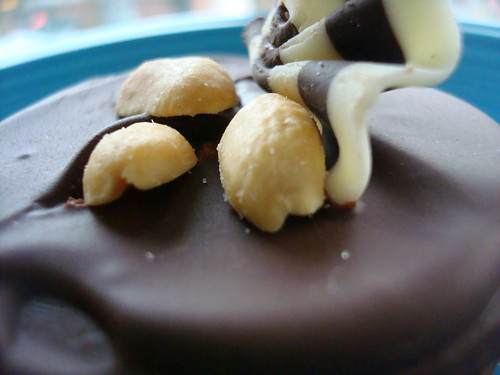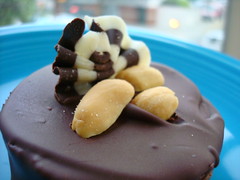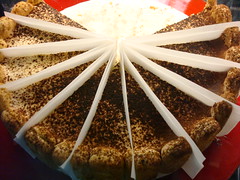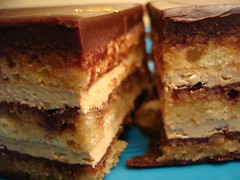
It's the end of the month again, which brings certain things: rent is due, the calendar must be changed...and the Daring Bakers Challenge. This month, the assignment was to make a Gâteau Filbert (a challenge suggested by Mele Cotte). What is a Gâteau Filbert? Well, on first impression, it seemed to be a pinkies-out way of saying "Hazelnut Cake". But it made us wonder--is there a difference between a gâteau and a cake? It seems that we intuit differences between them--to us, a gâteau is something fancy from a French bakery, whereas cake is what your momma makes for your birthday. You can't make a gâteau from a mix...right? But is there really a difference, or is it just translation? We took some time to tackle the issue, on several criteria. (Of course, if you just wanna bake already, please continue on to find the recipe link below).
 Cake: a sweet, baked, breadlike food, made with or without shortening, and usually containing flour, sugar, baking powder or soda, eggs, and liquid flavoring
Cake: a sweet, baked, breadlike food, made with or without shortening, and usually containing flour, sugar, baking powder or soda, eggs, and liquid flavoring
Gâteau: a cake, esp. a very light sponge cake with a rich icing or filling.
Cake. The original dividing line between cake and bread was fairly thin: [in] Roman times eggs and butter were often added to basic bread dough to give a consistency we would recognize as cakelike, and this was frequently sweetened with honey. Terminologically, too, the earliest English cakes were virtually bread, their main distinguishing characteristics being their shape--round and flat--and the fact that they were hard on both sides from being turned over during baking...
Gâteau. English borrowed gâteau from French in the mid-nineteenth century, and at first used it fairly indiscriminately for any sort of cake, pudding, or cake-like pie...Since the Second World War, however, usage of the term has honed in on an elaborate 'cream cake': the cake element, generally a fairly unremarkable sponge, is in most cases simply an excuse for lavish layers of cream, and baroque cream and fruit ornamentation....
Cake is a Viking contribution to the English language; it was borrowed from Old Norse kaka, which is related to a range of Germanic words, including modern English cook.
Gâteau is the modern French descendant of Old French guastel, 'fine bread'; which is probably of Germanic origin.Perhaps the more direct Germanic lineage of the word "Gateau" would explain why of the two it seems more closely related to the torte?
- It seems to us that while a Gâteau is a cake, a cake is not necessarily a gâteau.
- Cakes are more likely to have a buttercream frosting, whereas gâteaux are more likely to have a rich buttery between-layer ingredient, and generally has a thinner icing.
- Like many French things, a gâteau is just fancier. At least, we've never seen a Gâteau Funfetti in the cake mix aisle.
- Alas--a gâteau takes longer to make, and goes stale quicker. Not that we have any problem getting it into our bellies before it goes stale...
- Regardless of name or origin, both are exceedingly delightful.





